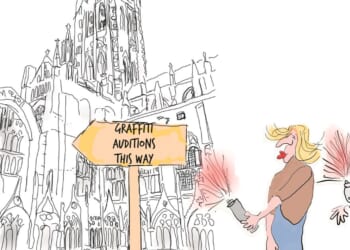SOMEONE at Church House, Westminster, once told me that he had an annual award for the person in the Church of England “On whom the bucket of excrement has been emptied from the greatest height”, only he didn’t say “excrement”. This was in the days before there were communications units whose job it is to choke off such communication.
But, even if no one could talk to a journalist like that today, the prize is still worth awarding, and this year’s winner is the next Archbishop of Canterbury, whoever that turns out to be. Last year’s winner was also the Archbishop of Canterbury, but the prize is sometimes awarded elsewhere.
I am writing when we have nothing but speculation about this year’s winner; but, by the time you read this, it is quite possible that the name will be known.
But we know that the job is horrible, and will probably end in obloquy and failure. This is one of the reasons that it starts with a honeymoon period, when the contrast with the previous incumbent is clear in memory. All kinds of journalists will, in the honeymoon, write sympathetic pieces about how the new person is so very different from the last one, and will succeed at everything at which the old one failed.
If the predecessor was plodding and managerial, the new man is wonderful because he writes poetry and is, well, profound; in ten years’ time, the next new man is wonderful because he is businesslike, plain-spoken, and has no time for poetic obfuscation. If this year’s winner is a woman, she will be absolutely marvellous for a while because she is not a man. So it goes.
The subtext of all these articles is that “Now at last we have an Archbishop who agrees with me!”; so the first disappointment is already in view. Later, the paper’s editor will discover that the Archbishop is attempting to usurp their job as the conscience and moral lodestone of the nation, and the tone will shift through condescension to contemptuous hostility. The Telegraph and the Mail used to specialise in headmasterly regret at the Archbishop’s obtuse inability to do as he was told; The Guardian had its own style of condescension.
This is all more or less clean fun, and anyone in public life must get used to it. But the next stage in public disillusionment can get dangerous. In this, the enemies that the Archbishop has by then made within the Church, for reasons understood as theological, will form an alliance with the external enemies, and feed an endless series of damaging snippets of gossip, in which the Archbishop must hope to be portrayed as a hapless incompetent, but will probably be shown up as a scheming malevolent. All of the qualities for which the Archbishop was praised at the start of their term will now be used to explain every failure in every part of the Church — which will, of course, be written about as a coherent organisation.
ALL this assumes that newspapers will continue to matter and to shape the channels through which public opinion flows, but that will not be true for long. In a post-literate age of smartphones and AI-generated videos, no one will have time for the appearance of reasoned argument. Words will be reduced to captions.
Consider that President Trump has started to put these things up on Truth Social: most recently, one in which two leading Democratic Party politicians are seen — one wearing a sombrero — while the other explains that his own party is “Woke pieces of shit” who are bringing in aliens who don’t speak English to vote for them. Of course, this is AI-generated, but soon that won’t be flagged, and no one will know whom or what to trust.
If this style of political attack makes it across the Atlantic, we have gone rather further down the drain than the cruelty and dishonesty of the printed press could ever push us. You can say that this does no more than animate the kind of satirical speech bubbles which have been a staple of Private Eye’s humour for 60 years now; but people believe in moving pictures as they don’t believe in words. As President Trump himself said, “Wait a minute, am I watching things on television that are different from what’s happening?” The thought seems to have worried him for a moment, before he want back to believing whatever he had seen on Fox News.

















